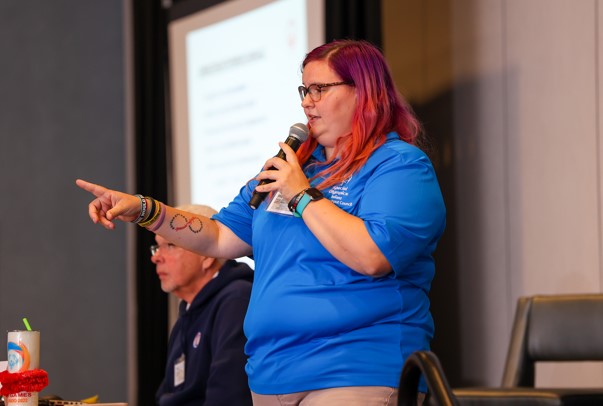When Melony Salla, a Special Olympics Indiana athlete, walks into a doctor’s office, she wants to be treated like what she is, the expert on her own body. But for much of her life, that wasn’t the case. Too often, doctors directed questions to her mom, even though Melony was the one experiencing the symptoms. “I live in this body, not my caregiver,” she said. “I want to have the voice in it.” That frustration turned into motivation when Melony joined Special Olympics Indiana’s Athlete Leadership. Through the program, she took on a leadership role that would connect her lived experience to real solutions: helping create a new public-facing website called 4ourhealth with the Indiana University School of Medicine to make healthcare more inclusive for people with intellectual and developmental disabilities (IDD).
As the lead fellow on the Indiana University project, she helped review content, guide videos, and ensure that everything on the website was accessible and easy to understand. “We made videos on what to expect at the doctor, like a chest exam,” Melony explained. “We wanted it to be something anyone could understand, with or without a disability.” The work stretched her in new ways. “Delegation was a big learning curve for me,” Melony admitted. “But working with a team taught me communication and leadership skills I now use in my full-time job.”
For Dr. Mary Ciccarelli, the project’s clinical lead and a professor at Indiana University, athlete input wasn’t just valuable, it was indispensable. “Nothing for us without us is a principle I’ve carried my whole career,” she said. “Every week, athletes reviewed the content. They told us what made sense, what didn’t, and what felt boring. Their feedback turned the site into something real. We now have interactive quizzes, flip cards, and videos instead of just walls of text.” One moment stood out for Dr. Ciccarelli when the group was shaping content about gynecological care. Women with IDD in the group spoke openly about their fears and concerns, shifting the resource from a clinical checklist to an empowering guide built on trust and prevention. “Those were lessons we wouldn’t have learned without their voices,” Mary reflected.
Today, the site features more than 40 videos covering everything from MRIs and dental visits to healthy habits and managing chronic conditions. It’s in a soft launch now, with usability testing underway. Early feedback already shows impact with athletes reporting feeling more prepared and confident before going to the doctor. For Melony, that’s the true win. “Athletes tell me, ‘This helped me know what to expect before going to the doctor,’” she said. “That’s exactly the goal, confidence and independence.” She’s also seen the change ripple through her own life. In addition to her role as an athlete leader, she now works as a teaching assistant, where her communication and leadership skills shine every day. “I can’t talk highly enough about this project,” Melony said.
“It’s not just going to help people with disabilities, it’s going to help everyone.”
Melony Salla
Melony’s journey from being spoken over in doctor’s offices to shaping the way medical professionals are trained is proof of what happens when lived experience is placed at the center of change. For her, the message is simple but powerful: inclusion isn’t just about being present, it’s about being heard. And now, because of her leadership, more people with IDD will walk into appointments not just as patients, but as partners in their own care.
